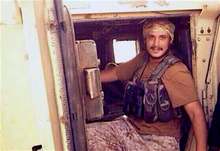Abu Jandal al-Kuwaiti
| Abu Jandal al-Kuwaiti | |
|---|---|
 |
|
| Birth name | Abdul Mohsen al-Zaghilani al-Taresh or Abdul Mohsen Al-Dhufairi |
| Nickname(s) | "The Lion" |
| Born | 1970s or 1980s Al Jahra, Kuwait |
| Died | 26 December 2016 Near Jabar, Raqqa Governorate, Syria |
| Allegiance |
|
| Service/branch | Military of ISIL |
| Years of service | ?–2016 |
| Rank | "Number two military commander" for ISIL operations in Syria |
| Commands held |
|
| Battles/wars |
War on Terror: Military intervention against ISIL
|
| Spouse(s) | Rahaf Zina |
| Relations | Hussein Al-Dhufairi (possibly brother) |
War on Terror: Military intervention against ISIL
Abdul Mohsen al-Zaghilani al-Taresh, or Abdul Mohsen Al-Dhufairi, better known by his nom de guerre Abu Jandal al-Kuwaiti, (1970s/80s – 26 December 2016) was one of the highest-ranking commanders of the Islamic State of Iraq and the Levant by late 2016. According to the Syrian Observatory for Human Rights, he served as the "number two military commander for IS in Syria", and was killed by a US airstrike while leading the defense of ISIL's de facto capital Raqqa against the Syrian Democratic Forces (SDF).
Generally, relatively little is known about al-Kuwaiti. His birth name has been reported as either "Abdul Mohsen al-Zaghilani al-Taresh" or "Abdul Mohsen Al-Dhufairi". He was born in the city of al Jahra in Kuwait, likely during the 1970s or 1980s, and was at some point influenced and radicalised by Jihadist ideology. As result, he ventured to Syria, where he joined the Islamic State of Iraq and the Levant. Over time, he began to play an important role in recruiting new members for ISIL through social media, appearing in propaganda videos and carrying out executions. In this way, he won considerable fame and many fans and followers in his home city Al Jahra.
Sometime after joining ISIL, he married the Syrian Jihadist Rahaf Zina, though other reports stated that his wife was Iraqi. The couple eventually had a son, Jandal, whereupon he adopted his nom de guerre Abu Jandal al-Kuwaiti ("Father of Jandal, the Kuwaiti"). He also rose in ranks as military commander, while becoming popular among subordinate ISIL fighters due to his reported modesty. By July 2014 he had become a top commander of the Islamic State's 6,000-men strong Army of Hasakah, personally leading the Knights Battalion. Over time, al-Kuwaiti became a "troubleshooter" for ISIL, and the battalion under his command subsequently became known the "Rapid Response Battalion". In August 2014, he helped to brutally supress the Al-Shaitat tribal rebellion, and around September of that year, he fought in Deir ez-Zor.
...
Wikipedia
